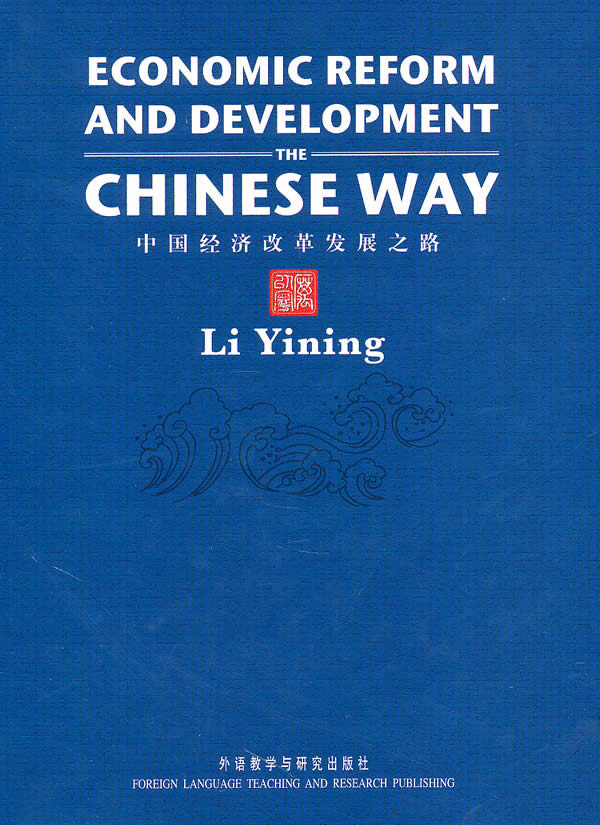- ISBN:9787513500890
- 装帧:暂无
- 册数:暂无
- 重量:暂无
- 开本:16开
- 页数:344
- 出版时间:2010-09-01
- 条形码:9787513500890 ; 978-7-5135-0089-0
本书特色
《中国经济改革发展之路》:Economic restructuring may break down if price reform fails. Thesuccess of economic restructuring, however, hinges not on pricereform, but on ownership reform, which entails revamping the corpo-rate system. This is because price reform serves the main purpose ofshaping an environment in favor of the growth of the market economy,but only ownership reform or corporate system reform can addresssuch issues as interests, responsibility, motivation, and incentives.Li Yining
目录
foreword
1. the role of education in economic growth (1980)
2. effective and rational investment under socialism (1982)
3. basic thoughts on economic restructuring (1986)
4. a tentative study of socialist ownership structure (1987)
5. two types of disequilibrium and the mainstream of current economic restructuring (1988)
6. relationship between economic reform, growth and industrial restructuring (1988)
7. laying a solid foundation for new culture (1989)
8. cultural economics: a tentative study (1990)
9. environmental protection and compensation to victims of environmental damage (1990)
10. coordinating economy and environment in less developed regions (1991)
11. comparative economic history and the modernization of china (1993)
12. growth and fluctuations in economic disequilibrium (1993)
13. property rights reform of rural enterprises (1994)
节选
《中国经济改革发展之路》内容简介:The 16 essays featured in Economic Reform and Development the Chinese Way were chosen from amongst those I wrote and published during the period 1980-1998. They are reflections of my thoughts on certain important issues pertinent to the economic development of China in the intervening years.
相关资料
Economic disequilibrium in the second category is characterized by an incomplete market and inflexible prices, and more importantly, by a market filled with microeconomic agents that, instead of being independent commodity producers making their own business decisions and bearing their own gains and losses, neither have the freedom to choose investment opportunities and management modes nor bear the responsibility for investment and management risks. Such microeconomic agents have not shaken off their status as government subsidiaries or are bound hand and foot by their pre-capitalist ties.If my division of economic disequilibrium stands, there is reason to believe that the disequilibrium in a capitalist economy belongs in the firstcategory and that the disequilibrium in a pre-capitalist economy belongs in the second category. What happens in a socialist economy should be treated differently. Disequilibrium under a traditional and dual-track economic system falls into the second category because its enterprises have yet to shake off their status as government subsidiaries. Under the new economic system born of economic reform, enterprises become independent commodity producers that make their own investment and business decisions, and are liable for their gains, losses as well as investment and business risks. Thusthe disequilibrium in the new economic system falls into the first category.In the first category of disequilibrium, microeconomic agents are fullof vitality. However, these microeconomic agents are in an economic disequilibrium. They make transactions in incomplete markets where pricesare inflexible and information is incomplete and congested. Therefore, suchvitality is limited by this environment. For instance, price rigidity makes it hard for these agents to adjust production in response to price signals, and wage rigidity also prevents them from optimizing their resource allocations. However, a microeconomic agent that has full vitality but is circumscribed by its environment is very different from a microeconomic agent that lacks Mfull vitality. This is exactly the difference between the first and second categories of disequilibrium.
作者简介
厉以宁,1930年出生于江苏省仪征市。北京大学社会科学学部主任、北京大学光华大学管理学院名誉院长、经济学教授。1988-2002年任全国人大常委、全国人大财经委员会副主任委员、法律委员会副主任委员,2003-2007年任十届全国政协常委、全国政协经济委员会副主任。现任十一届全国政协常委、全国政协经济委员会副主任、中国企业投资协会副会长。我国*早提出股份制改革理论的学者之一,并提出了中国经济的非均衡理论,这些学说对中国经济的发展产生了深远的影响。因在经济学以及其他学术领域中的杰出贡献而多次获奖,包括“孙冶方经济学奖”、“国家中青年突出贡献专家证书”、“金三角”奖、国家教委科研成果一等奖、中国环境与发展国际合作奖(*高奖)、第十五届福冈亚洲文化奖——学术研究奖(日本)等。曾多次被邀请到国内外多所大学和科研机构演讲。主要著作:《教育经济学》、《中国经济改革的思路》、《非均衡的中国经济》、《中国经济改革与股份制》、《股份制与现代市场经济》、《转型发展理论》、《超越市场与超越政府——论道德力量在经济中的作用》、《资本主义的起源——比较经济史研究》、《罗马-拜占庭经济史》和《论民营经济》等。
-

图解资本论
¥13.8¥46.0 -

中世纪商业合伙史
¥18.6¥49.0 -

博弈论
¥14.1¥38.0 -

认知世界的经济学
¥45.1¥48.0 -

国富论
¥10.5¥35.0 -

1949-2009-八次危机-中国的真实经验
¥33.0¥55.0 -

经济常识一本全
¥11.2¥35.0 -

薛兆丰经济学讲义:来自超过25万人的经济学课堂
¥37.2¥98.0 -

置身事内 : 中国政府与经济发展
¥45.5¥65.0 -

经济学通俗读物:北大经济课(受益一生的经济学智慧)
¥12.3¥35.0 -

底层逻辑
¥18.1¥42.0 -

博弈论
¥12.2¥36.0 -

经济学通识-第二版
¥22.0¥58.0 -

曾国藩的经济课
¥25.8¥68.0 -

元代榷盐与社会(2009/8)
¥11.1¥30.0 -

金融炼金术(专业珍藏版)2021专业审订
¥38.5¥55.0 -

(平装)哈佛经济课
¥16.7¥45.0 -

哈耶克论自由文明与保障
¥14.4¥38.0 -

一课经济学
¥18.1¥42.0 -

唐代政治经济史综论:甘露之变研究及其他
¥19.6¥40.0










